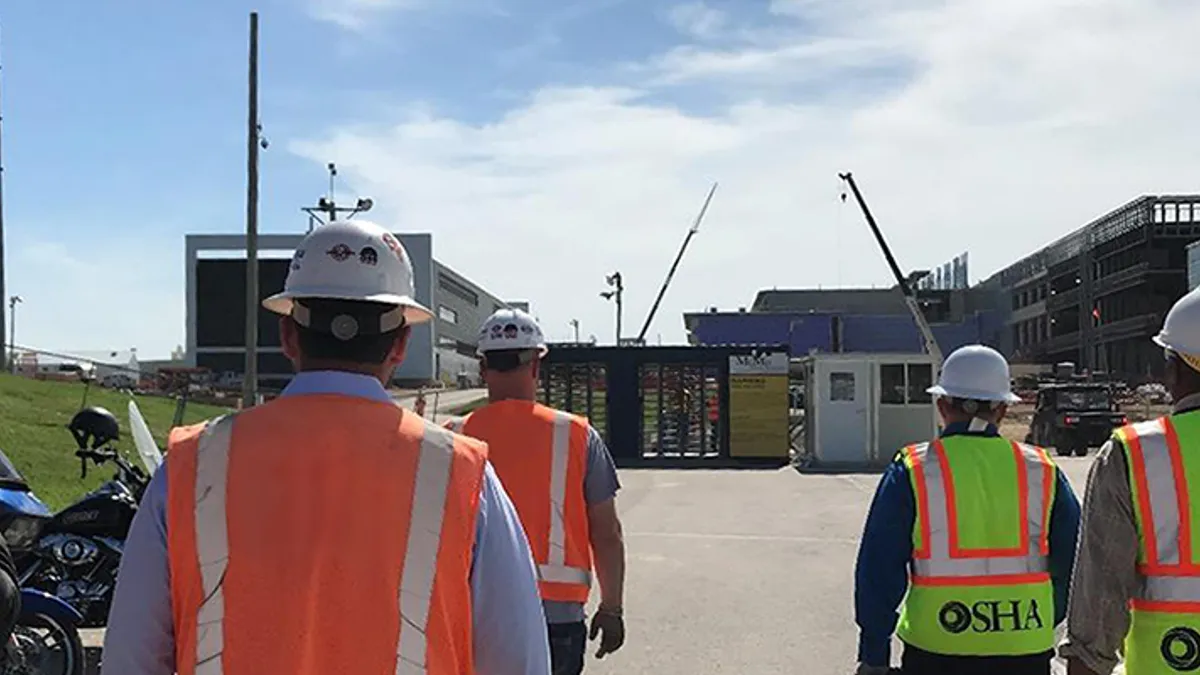Dive Brief:
- OSHA has issued two new pieces of enforcement guidance for employers, one for recording COVID-19 cases and the other regarding its plans for on-site inspections. Both are limited to the duration of the current novel coronavirus public health crisis.
- The agency said employers must record a case if the employee's illness is diagnosed as COVID-19 as defined by the Centers for Disease Control and Prevention (CDC); is work related; and meets one or more of OSHA's general recording criteria — death, days away from work, restricted work or transfer to another job, medical treatment beyond first aid, loss of consciousness or a diagnosis considered significant by a physician or other health care professional.
- In the other directive, OSHA said that in areas of the United States where the spread of COVID-19 has decreased, it will return to its pre-pandemic inspection policy but that it will continue to prioritize coronavirus cases; will use phone, fax and rapid response inspections where appropriate; and will ensure that inspectors take all safety precautions when dealing with COVID-19 cases. In areas still experiencing high levels of COVID-19 cases, OSHA will continue to prioritize high-risk workplaces for onsite inspections.
Dive Insight:
In its latest guidance to employers, OSHA acknowledged that it could be difficult to determine whether employees diagnosed with COVID-19 were exposed at work or elsewhere, so the agency went into more detail than it previously has about how employers should approach that determination. OSHA said COVID-19 illnesses are likely work related if:
- Multiple cases develop among those who work closely together and there is no alternative explanation.
- An employee contracts the illness shortly after "lengthy and close" exposure to a customer or coworker who has a confirmed case of COVID-19 and there is no alternative explanation.
- Job duties include frequent, close exposure to the general public in a locality with ongoing community transmission and there is no alternative explanation.
Cases of COVID-19 are likely not work related if:
- An employee is the only employee in the work area to contract the illness and does not have frequent contact with the general public.
- An employee, outside the workplace, has frequent and close contact with someone who has COVID-19 and that person is not a coworker and likely exposed the employee while infectious.
If after a "good-faith" evaluation, an employer still can't come to a conclusion as to whether a case is work related, then it does not have to record the illness.
The main difference between this and previous guidance about reporting COVID-19 cases, according to attorney Phillip Russell with Ogletree, Deakins, Nash, Smoak & Stewart in Tampa, Florida, is that OSHA is reinstating enforcement of recordkeeping related to COVID-19. The work-related requirement remains, and the agency added clarification that a one-person infection is not likely to be work related. Employers, he said, also have some flexibility with the requirement if they make a reasonable determination based upon objective evidence available at the time.
"None of this changes the underlying difficulty in making a work-related determination," Russell said. "This additional guidance provides a roadmap for employers to make that determination based on reasonable efforts and objective information."












